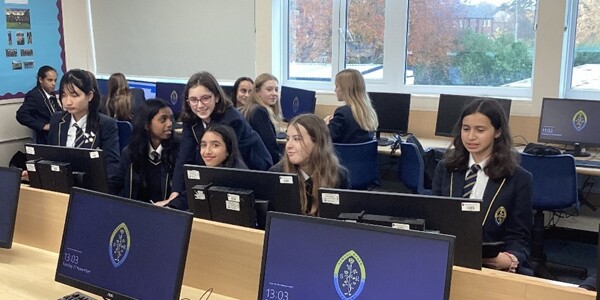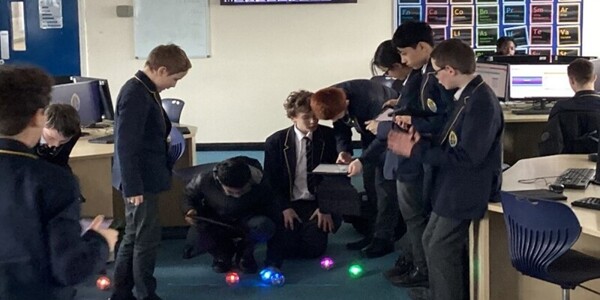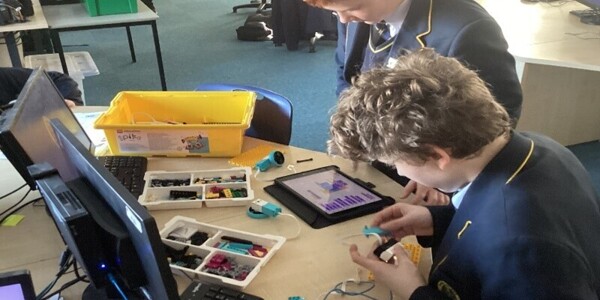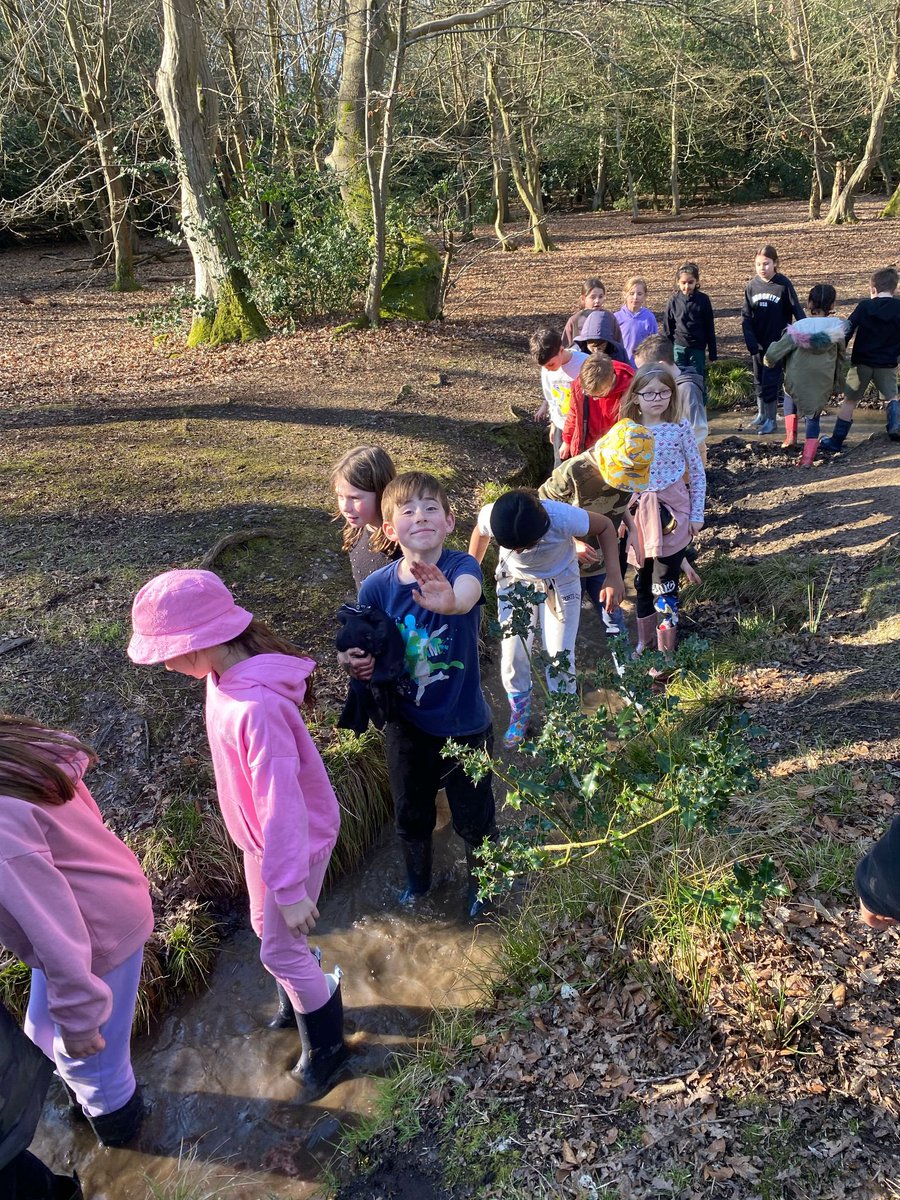Computer Science
Computer science at Samuel Ryder Academy aims to develop confident digital users who are adaptable to change in the technological world. We believe that, with computers forming an ever more integral part of people’s lives, our curriculum must equip students with the skills they need to achieve in a rapidly changing world. We do this by providing them with a solid foundation in the principles of computer science along with digital literacy, e-safety and practical ICT knowledge. In doing this, we ensure that students feel confident in navigating the virtual world safely and responsibly.
KS1
The KS1 computer science curriculum has three core components, computer science, ICT and digital literacy. The first three half-terms generally focus on ICT and digital literacy, working on areas such as keyboard skills, learning major productivity apps and being a good digital citizen. The latter half of the year, when the children are more mature, is devoted to computer science. Students learn the skills of computational thinking, which includes the design, implementation and debugging of algorithms. These skills are taught and applied in a variety of different settings including ‘unplugged’ activities, where no computer is required, coding on a computer or iPad, or programming using a physical computing device such as the Beebot.
|
|
Autumn |
Spring |
Summer |
|
Year 1 |
Introduction to Seesaw, Text and Images, Computer Skills |
Painting in Seesaw, Unplugged programming |
E-Safety Personal information and keeping it private, Plugged-in programming |
|
Year 2 |
Uses of IT: Digital Art, Data handling and Databases |
E-Safety, Programming: Predicting code |
Introduction to animation, Programming Scratch Junior |
KS2
In KS2, students are exposed to the three pillars of computing: Digital Literacy, Information Technology and Computer Science. As an all-though school, we have carefully planned our curriculum to provide a smooth progression form KS2 and KS3, along with providing the necessary resources to enable students from other schools to finish year 7 at the same high standard as their peers.
|
|
Autumn |
Spring |
Summer |
|
Year 3 |
Document Creation, Touch Typing, E-safety |
Digital Art, Programming: Sequencing with text |
3D modelling, Programming: Inputs and outputs |
|
Year 4 |
E-safety, Image editing |
Internet research, E-book creation |
Programming: Selection and variables, Scratch quiz project |
|
Year 5 |
Networks & computer systems, E-safety |
Data Handling, Programming Physical devices |
Video Editing, Programming with variables |
|
Year 6 |
Data Handling, Binary code, graphic design |
Machine learning, E-safety |
Programming: Events and functions, Web Design |
KS3
Students get to experience an exciting and challenging curriculum that includes the fundamentals of computer science, digital literacy and e-safety. Throughout the KS3 curriculum students explore the concepts of computer science and develop a clear understanding of the subject matter. In recognising the potential pitfalls of technology, e-safety and digital legislation awareness, across the plethora of devices, is embedded throughout the course.
Digital technology is at the heart of computer science. Students are not only learning about how computers work but also have access to a wide variety of digital technology to support the development and learning in the subject. Throughout the computing curriculum, students will use their iPad as a digital backpack. All of the class resources will be accessible to them via their personal iPad. In addition to this, students will also get hands on with a variety of digital technology.
We have a huge focus on both literacy and numeracy. A wide range of resources involving texts, extracts and the internet are used to deliver engaging content. Literacy and oracy are concurrently developed as students are encouraged to share ideas and articulate their responses to other students through the use or technical language from the outset of the course. In this way, students develop the skills to listen with understanding and respond sensitively and appropriately.
SMSC
Students will learn about:
- the security required when using a computer
- the dangers that can be found on social media and the internet
- how to report and react to others inappropriate use of computers
- British laws relating to the use of computers such as the Copyright and Patents Act
- Cyber crime
- The internet
- The impact of British computer scientists
- Ethical and environmental issues surrounding the use of technology
- Digital Divide
|
|
Autumn |
Spring |
Summer |
|
Year 7 |
Microsoft Office 365, The impact of technology, Visual Programming Scratch |
Spreadsheets, Gaining support for a cause |
Amazon Robotics challenge |
|
Year 8 |
Computer Systems, Introduction to Python |
Computer Networks, Swift Playgrounds |
Amazon Robotics challenge |
|
Year 9 |
The CPU, RAM & ROM, Secondary Storage, Algorithms |
Programming with Python the next steps, Networks |
Data Representation, System Software |
KS4
With the fast pace of technological advances, our computer science curriculum is constantly updated to reflect the emerging hardware and software advances as they are released. This exciting content, has recently been updated to include units of work incorporating Micro: Bits, Spheros, Lego spike kits and VR headsets. Students also have apps available to them via their iPads such as Swift Playgrounds and app development. Concurrently, students are made aware of the emerging shifts in cyber-crime and the profile of the digital footprint. By tackling this issue head-on, students are equipped to manage their online presence.
By discussing the nature of artificial intelligence and how this can be effectively used to enhance work and social life, students debate this important social and moral issue. This augments a package of planned oracy opportunities throughout the course, building students’ awareness of topical issues within computer science and developing their reflection and higher order thinking skills. Teachers encourage the use of formal language, the use of key words and full sentences in order to support literacy development as well as improve the quality of students’ longer examination questions. We want our students to develop increasing confidence and competence in speaking and listening so that they are able to: clarify and express their ideas and explain their thinking. By adapting their speech to a widening range of circumstances including paired and group discussions and speaking to a larger audience, students are better prepared to use varied and specialised vocabulary when speak for a range of purposes.
SMSC
Students will learn about:
- the security required when using a computer
- the dangers that can be found on social media and the internet
- how to report and react to others inappropriate use of computers
- British laws relating to the use of computers such as the Copyright and Patents Act
- Cyber crime
- The internet
- The impact of British computer scientists
- Ethical and environmental issues surrounding the use of technology
- Digital Divide
The Pearson Edexcel Level 2 GCSE (9–1) in Computer Science consists of two externally-examined papers.
Paper 1 is a written examination and Paper 2 is a practical onscreen assessment.
Paper 1: Principles of Computer Science (*Paper code: 1CP2/01)
Written examination: 1 hour and 30 minutes
50% of the qualification
75 marks
Content overview
This paper will assess Topics 1 to 5.
● Topic 1: Computational thinking – understanding of what algorithms are, what they are used for and how they work; ability to follow, amend and write algorithms; ability to construct truth tables.
● Topic 2: Data – understanding of binary, data representation, data storage and compression.
● Topic 3: Computers – understanding of hardware and software components of computer systems and characteristics of programming languages.
● Topic 4: Networks – understanding of computer networks and network security.
● Topic 5: Issues and impact – awareness of emerging trends in computing technologies, and the impact of computing on individuals, society and the environment, including ethical, legal and ownership issues.
Assessment overview
This paper consists of five compulsory questions, each one focused on one topic
Paper 2: Application of Computational Thinking (*Paper code: 1CP2/02)
Onscreen examination: 2 hours
50% of the qualification
75 marks
Content overview
This paper will assess Topic 6: Problem solving with programming.
The main focus of this paper is:
● understanding what algorithms are, what they are used for and how they work in relation to creating programs
● understanding how to decompose and analyse problems
● ability to read, write, refine and evaluate programs.
Assessment overview
This practical paper requires students to design, write, test and refine programs in order to solve problems.
Students will complete this assessment onscreen using their Integrated Development Environment (IDE) of choice.
They will be provided with:
● coding files
● a hard copy of the question paper
● the Programming Language Subset (PLS) – as an insert in the question paper and in electronic format.
Students should then answer the questions onscreen using Python 3.
This assessment consists of six compulsory questions
|
|
Autumn |
Spring |
Summer |
|
Year 10 |
SLR 1 System Architecture SLR2 System Software SLR3 Data Representation Programming
|
SLR 4 Computer networks and protocols SLR 5 Networks and cybersecurity SLR6 Ethical/environmental and legal issues Programming |
SLR 7 Basic programming concepts SLR 8 Advanced programming concepts SL9 Robust and secure programs Programming |
|
Year 11 |
SLR10 Algorithms and Computational thinking SLR11 Classification of programming concepts |
Revision and Exam Preparation |
Exams |
Exam Board website
Computer Science (2020) | Pearson qualifications (GCSE 1CP2)
Beyond GCSE
Students can continue to develop their knowledge and skills of computing concepts and choose to study A-level computer science at Key Stage 5.
Computer science will equip you with a range of transferable practical and theoretical skills to help you succeed in you chosen career path, such as:
- Computational Logic
- Problem Solving
- Programming
- Digital literacy
- Cyber security
- Creating and designing solutions
Wider Curriculum and Careers
Additional opportunities: Key Stage 2 and Key Stages 3 students have the opportunity to attend coding club where they are able to complete fun coding challenges. We also offer students the opportunity to complete iDEA. The Inspiring Digital Enterprise Award, known as iDEA is an international programme that helps you develop digital, enterprise and employability skills for free. Through our series of online challenges, you can win career-enhancing badges, unlock new opportunities and, ultimately, gain industry-recognised Awards that help you stand out from the crowd.
Students also enter the Bebras computational thinking challenge. The Bebras challenges consists of a set of short problems called Bebras tasks and are delivered online. The tasks are fun, engaging and based on problems that computer scientists often meet and enjoy solving. The tasks can be solved without prior knowledge but instead require logical thinking.
Year 8 girls have the option to take part in ‘The CyberFirst Girls Competition’ which aims to inspire girls interested in technology to pursue a career in cyber security. The competition is a team event. Each team – consisting of up to four girls. Students need to tackle challenges from cryptography and logic to artificial intelligence and networking for the chance to be crowned cyber security champions.
The computing department also facilitates two House competitions open to all students and staff. These are 'Game of Drones' where students will use drones to navigate an obstacle course and a 'touch typing competition'.
Through trips to the Cambridge computing museum and Bletchley Park, students are able to creatively engage with information and digital technologies and their history. They have the chance to take part in a number of workshops including programming and electronics workshops, activities exploring the history of computing and other interactive educational opportunities using people's stories along with 1980s BBC Micro, Raspberry Pi and Micro:Bit.
The computer science curriculum provides students with the digital literacy skills needed for the modern work place along with the opportunity to allow students who have a passion for the subject to study computing at all key stages. This can lead to potential careers in: -
- System Engineer
- Robotics
- Electronics
- Cyber Security
- Data analysis
- App design
- Programming
- Games Design
CyberFirst Competition

Game of Drones

Lego Kits























